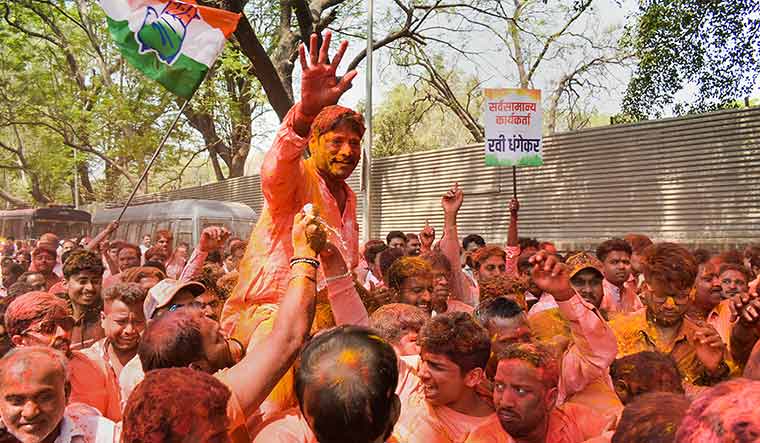A week before the assembly byelection in Kasba Peth, Pune, senior BJP Minister Chandrakant Patil was asked whether Ravindra Dhangekar of the Congress would be a formidable opponent. “Who is Dhangekar?” he shot back.
On March 2, Dhangekar beat BJP man Hemant Rasane by around 11,000 votes.
Sure, the BJP defeated the Nationalist Congress Party to retain Chinchwad, but that was a pyrrhic victory. Kasba Peth had been a BJP bastion for close to three decades and it also houses the Rashtriya Swayamsevak Sangh’s Maharashtra headquarters.
The byelection was necessitated by the death of Mukta Tilak, the sitting BJP MLA. The great granddaughter-in-law of freedom fighter Bal Gangadhar Tilak, Mukta had trounced her Congress-NCP opponent in the 2019 elections.
Interestingly, Dhangekar had approached the state BJP leadership for a ticket ahead of the election. A four-term corporator in the Pune Municipal Corporation, Dhangekar was earlier with Raj Thackeray’s Maharashtra Navnirman Sena. He joined the Congress only in 2017.
A down-to-earth leader with a ‘can do’ spirit, Dhangekar moves around Pune on a two-wheeler and keeps his office open to the public from 8am to midnight. He spends close to 10 hours a day listening to people, calling up municipal authorities to solve their problems and simply chatting with his supporters.
In his previous electoral efforts, Dhangekar had finished runner-up to BJP-Shiv Sena candidate Girish Bapat in the 2009 assembly election, leaving behind the Congress hopeful. In 2014, when all parties fought the state elections on their own, Dhangekar had come a close third, polling close to 26,000 votes. So, he was always a strong candidate.
What his win now has shown is that Kasba Peth was a saffron bastion and not a BJP one as the party had believed. And leaders like Patil are the ones to blame.
All previous BJP legislators from Kasba Peth were Brahmins. The community accounts for about 14 per cent of the constituency. Marathas and OBCs together form a major chunk of the population. And though from a particular caste, the previous BJP winners had an excellent personal equation with all communities and parties, which helped them a lot. This is where Rasane fell short. An OBC candidate, Rasane paled in comparison to Dhangekar, also an OBC, in terms of personal popularity, and lost despite BJP heavyweights pouring in time and resources into his campaign.
Another important factor for the BJP’s past success in the seat has been the Shiv Sena vote bank of around 15,000. When the BJP and the Sena put up a joint candidate, the Sena votes would invariably go to the BJP. But, with Uddhav Thackeray now with the Maha Vikas Aghadi, a majority of the Sena votes went to Dhangekar. This clearly meant that Chief Minister Eknath Shinde, despite winning the Shiv Sena symbol and camping in Pune, could not transfer the Sena votes to Rasane. Of the 15,000-odd votes Bapat used to poll from this base, Rasane could corner only about 9,000.
The most crucial takeaway from the Kasba Peth result, said political analyst Abhay Deshpande, was that, in the case of a straight fight between the BJP-Shinde alliance and the MVA, the latter seems to have a distinct edge. “The claim that Kasba Peth was a BJP bastion is a half-truth,” he said. “Post 2009, the BJP has been winning there because of the division of anti-BJP votes among strong candidates. So, if the MVA puts up a strong candidate and ensures that no other strong candidate is in the race, the BJP will be at a disadvantage in many constituencies across the state in both the Lok Sabha and assembly elections.” Shiv Sena (Uddhav) leader Sanjay Raut has already predicted that the MVA will win 38 to 40 (of 48) seats in the general elections and around 175 (of 288) seats in the assembly polls. Keeping aside the exaggeration in Raut’s claims, Kasba Peth would be a wake-up call for the BJP.
Former deputy chief minister and senior NCP leader Ajit Pawar said Kasba Peth had shown the way forward for the MVA leadership. “We have to stay united, give tickets only to candidates with elective merit and make sure that there is a direct contest with no strong third candidate,” he said. “If so, victory will be ours in both the Lok Sabha and assembly elections.”
He also pointed out that, in Chinchwad, the MVA candidate Nana Kate lost to the BJP’s Ashwini Jagtap because of the sympathy factor. It was the death of Jagtap’s husband, Laxman, that necessitated the byelection. Also, there was a strong independent candidate, Rahul Kalate, who got around 44,000 votes. Kalate and Kate had both asked for the NCP ticket; Kate got it and Kalate fought on his own.
The BJP admitted there was sympathy for Ashwini, but said that the Kasba Peth defeat was a one-off. Keshav Upadhye, chief spokesperson of the Maharashtra BJP, said the defeat did not mean that the MVA would beat the BJP-Shiv Sena (Shinde) alliance in the upcoming elections. “Kasba Peth was lost more due to Dhangekar’s personal network, accessibility and track record as an effective leader,” he said. “Our efforts fell short. Also, this was a byelection where the voting percentage was less than in assembly or Lok Sabha elections. If the MVA thinks that this is their victory and results will be similar next year, let them continue to dream.”
Another BJP leader felt that the Lok Sabha elections would be fought under Brand Modi, whereas assembly polls will be a test of the popularity of Shinde and his deputy Devendra Fadnavis. “People in Maharashtra vote differently for Lok Sabha and assembly elections,” said the leader. “So, if we have to work hard for the Lok Sabha elections, we will have to work doubly hard for the assembly elections.”


